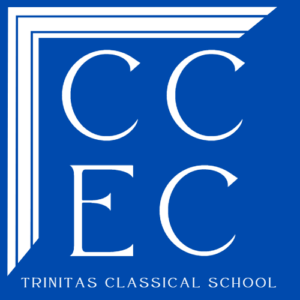 In our inaugural CCE Corner, we began discussing the lessons we’ve learned for thriving in a classical Christian school—and in life! This second lesson will be a more philosophical entry for the simple reason that it’s been our experience that it’s foundational for all education. We hope you will take the time to not only read this lesson, but also ponder what it means for your family and our Trinitas community.
In our inaugural CCE Corner, we began discussing the lessons we’ve learned for thriving in a classical Christian school—and in life! This second lesson will be a more philosophical entry for the simple reason that it’s been our experience that it’s foundational for all education. We hope you will take the time to not only read this lesson, but also ponder what it means for your family and our Trinitas community.
Lesson 2. You are what you love: baptizing your imagination
Authors J.R.R. Tolkien, C.S. Lewis, as well as George MacDonald before them, understood the importance of cultivating a wise imagination. These authors argued that fantasy is important for living in the real world. That’s in part because (good) fantasy stories increase our powers of observation and give us hope. But more than that, these authors believed stories are the primary way of truth-telling which brings back our identities as made in the image of God, the ultimate Storyteller.
Even if you aren’t familiar with these authors, perhaps you’ve seen ways in which the imagination plays an important role in education, in character development, and in spiritual formation. It is essential for understanding new or abstract concepts, for experimentation, for artistic expression, and for creative problem-solving. It is also essential for empathizing with other persons, those who are near to us in space and time and culture, but also those who are distant from us in any of these ways. It plays a crucial role in inspiring us to acts of loyalty or sacrifice or courage or mercy.
Fantasy literature and its effect on the imagination are important not only for living in the real world but also for living in the most real of worlds—the Kingdom of God. Lewis famously said his imagination was “baptized” by the fantasy writings of George MacDonald. Those stories prepared Lewis to understand and to be moved by the truths of the Christian faith.
Take just a minute to think about some of those truths:
Creation – ex nihilo, through the Eternal Word
The Fall – opening up an unbridgeable chasm between God and man
Redemption – wrought through the cosmos-inverting Incarnation of that same Eternal Word, his death, and resurrection—God himself forging the only way back to him for the here and now and for all eternity
Christ’s return – in judgment and glory, making all things new
If you don’t have a well-developed imagination, how will you begin to understand any of that? Why would you care? And how could you be moved to articulate a response?
As MacDonald writes, “[A] wise imagination, which is the presence of the Spirit of God, is the best guide that man or woman can have; for it is not the things we see most clearly that influence us most powerfully.” (“George MacDonald and the Mythic Imagination,” Emma Fox) So, reading good fantasy books to your children is a good idea; but, the tradition of cultivating a wise imagination goes further back than Lewis and MacDonald, and it encompasses more than fiction.
As Plato observed in his Republic, except in some extraordinary cases, a person has little hope for becoming good unless “from childhood his play and all his pursuits [are] concerned with things fair and good.” (Republic, 558b) And, more dear to us, this tradition is evident in Scripture. Read Paul’s words of encouragement to the Philippians: “Finally, brothers and sisters, whatever is true, whatever is noble, whatever is right, whatever is pure, whatever is lovely, whatever is admirable—if anything is excellent or praiseworthy—think about such things.” (Phil 4:8)
That verse is our school motto—it informs our curriculum choices and extracurriculars, and our culture in general. But, the school cannot do its job alone. This lesson, “You are what you love,” is an intentional play on “You are what you eat.” It is a reminder to think carefully about what you are feeding your souls. Whether you are at work or play, school or home, be in the habit of asking yourself, “Is it lovely?” and “Is it admirable?” and “Is it excellent or praiseworthy?”
Wise imaginations not only help us to recognize but also to love those things that are good and true and beautiful. That’s what good education does. In a relatively recent book, David Brooks, speaking about St. Augustine, says it this way: “Knowledge is not enough for tranquility and goodness, because it doesn’t contain the motivation to be good. Only love impels action. We don’t become better because we acquire new information. We become better because we acquire better loves. We don’t become what we know. Education is a process of love formation. When you go to a school, it should offer you new things to love.” (Brooks, The Road to Character, 2015, p. 211)
So, what are some specific things you can do to give your child and yourself better loves?
1. Read. Read. Read. And re-read good books. Old ones and new ones. On your own. As a family. With siblings. Read books together that are above some of you. Some that are below. And some that are just right. Read books outside your natural interests and from opposing perspectives. Share favorites with each other. Give books as gifts. (I think you get the point!)
2. Fill your souls with other good food. If you want to eat better, you can’t just get rid of junk food, you need to replace it with good food to “crowd out” the junk. Listen to good music. Watch good movies. Play games. Make art. Make music. Make believe. Play dress-up. Build things with Lego. Or with cardboard. Or wood. Cook good things to eat. Spend time outside. Notice things. Run around. It’s worth noting that strong imaginations can make parenting easier—you’ll find you need to say “no” a lot less if your children have lots of good “yes” options.
3. Be bored. This is an important one. Be bored. The mind needs free time in order to be creative. We recommend opportunities for boredom. Let your children be bored in the car. In the church pew. At an outing not centered around their interests. They’ll learn to be bored well—by A) giving their imagination time to work or B) pushing past the boredom to see what’s in fact interesting or worthwhile in their present environment. Giving the “gift” of boredom is giving the opportunity to use one’s imagination, but our culture doesn’t see it that way. Ironically, our desire to avoid boredom has led to increased boredom!*
These three things will help to grow your child’s (and your) imagination and prepare you to thrive in a classical Christian school. They’re certainly not an exhaustive list; you can use your imagination to come up with your own!
*It’s still a good idea to bring along some imagination-inspiring tools (e.g., drawing supplies, books, puzzles); just please don’t turn to screens to solve the boredom problem. In our next lesson, we talk tech.
